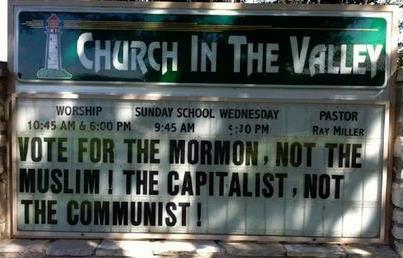Churches are categorized as "501(c) organizations." To speak in layman's terms, this means that they're nonprofits and, as such, are tax-exempt. This also means that they're either heavily limited or completely barred from any kind of political activity, which includes endorsing a political candidate.
Well, that certainly seems fair. But wait:
So I'm not an IRS agent, but man. If that's not endorsement of Romney, I don't know what is. What you're looking at, ladies and gentlemen, is the sign in front of Church in the Valley, located in Leakey, Texas. The pastor of Church in the Valley, Ray Miller, has taken all responsibility for the sign, and is apparently known for posting bold statements such as this one outside of his church. The sign was put up earlier in October, and it created a fair amount of squabbling over whether or not this should be considered free speech or a violation of the church's nonprofit status. I think Miller is entitled to his opinion as much as anyone else, and I also think he's entitled to have as many Romney signs in his front yard as his heart desires. Unfortunately, I'm not sure that he realizes that the church's front yard and his own are not one and the same.
This all begs the question: how is this church's status as a nonprofit legitimate? For the record, I don't believe that it's status should be permanently revoked, but if anything it should be treated as any other organization would be under these circumstances. Considering the financial state of the country, I don't understand why it wouldn't be prudent for the IRS to look into the matter.
You can read more about it on San Antonio's KENS 5 website here.

I see your point Taylor. As a nonprofit, an organization such as a church cannot have such strong outward opinions about the politics of our country. I believe that this church should be an example of what other churches should not be allowed to do. I don’t know if this is a Mormon church or not but I think it is a bad representation of true Christianity or even the Mormon Church. You will always find outliers or extremists in any religion or group. This is a perfect example of that. However, we should not let one extreme church affect the nonprofit status of others. That sign should have never been put up and I will go as far to say that this church is not one that practices what they preach. I hope individuals like Ray Miller don’t steer people away from Christianity, authentic Christianity.
ReplyDeleteI agree with you and would like to expand upon your assertions.
ReplyDeleteAccording to the Internal Revenue Service (IRS) website there is a restriction of political campaign intervention by Section 501(c)(3) of tax-exempt organizations. Under the Internal Revenue Code all 501(c)(3) organizations are absolutely prohibited from directly or indirectly participating in, or intervening in any political campaign on behalf of or in opposition to any candidate for elective public office.
The policy goes on to say that public statements of position either verbal or written (which was seen in this case), made by an organization in favor of or against any candidate for public office clearly violates the prohibition against political campaign activity. Such violation may result in denial or revocation of tax-exempt status and the imposition of certain excise taxes.
I agree with you that the IRS should investigate the legitimacy of the tax-exempt status of this church according to it's policies. However it is rare that an investigation leads to any reprimanding. Since the founding of the country until 1954 when Lyndon Baines Johnson was re-elected as Senator, churches were openly allowed to be in favor or against any candidate for public offices. LBJ proposed the legislation that stands today, which as stated above, disallows churches to publicly endorse a candidate. Since 1954 only one church has had their tax-exempt status revoked. The revocation occurred in result of the opinions expressed about the 1992 presidential election. A church had articles published in The Washington Times and USA Today against Bill Clinton.
Even if the IRS were to investigate the church in Leakey, TX, it is likely no real consequence would be dealt. So now the question is why does the IRS choose to remain quiet? An estimated total of 539 pastors participated in Pulpit Freedom Sunday last year, which is an annual event that intentionally provokes the IRS to take legal action against churches to consider the matter of free speech and religion in a court of law. No suits have been filed yet.
Yes, I agree this voids the churches 501c status as a non profit tax exempt organization that is limited on political activity. This type of freedom of speech doesn’t extend to churches when political endorsement is pushed.
ReplyDeleteWhile the actual phrase of separation of church and state isn’t in the constitution. There is an establishment clause in the first amendment basically stating the separation of church or state. Supreme Court Justice Hugo Black that” on the belief that a union of government and religion tends to destroy government and degrade religion.” A church supporting a candidate doesn’t actually go against separation of church and state, but let’s think about it the other way around. The GOP supporting Christianity in general. Is this a violation of the establishment clause? I think Christianity and religion in general is a good thing that promotes closer communities. I don’t think that GOP which holds many elected offices should be so closely tied with Christianity. The church and state has been dissolved together in GOP.